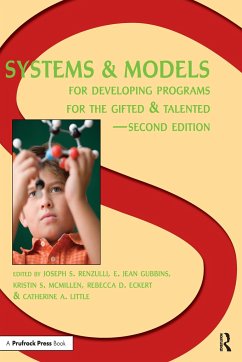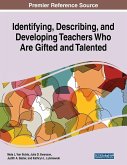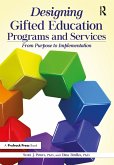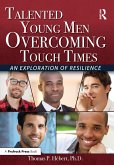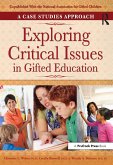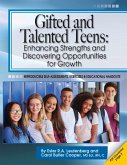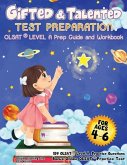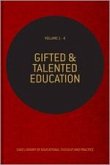Joseph S Renzulli, E Jean Gubbins, Kristin S McMillen, Rebecca D Eckert, Catherine A Little
Systems and Models for Developing Programs for the Gifted and Talented
Joseph S Renzulli, E Jean Gubbins, Kristin S McMillen, Rebecca D Eckert, Catherine A Little
Systems and Models for Developing Programs for the Gifted and Talented
- Broschiertes Buch
- Merkliste
- Auf die Merkliste
- Bewerten Bewerten
- Teilen
- Produkt teilen
- Produkterinnerung
- Produkterinnerung
Forty-two experts in gifted education contributed to 25 chapters, and each chapter includes a discussion of the model, theoretical underpinnings, research on effectiveness, and considerations for implementations.
Andere Kunden interessierten sich auch für
![Identifying, Describing, and Developing Teachers Who Are Gifted and Talented Identifying, Describing, and Developing Teachers Who Are Gifted and Talented]() Identifying, Describing, and Developing Teachers Who Are Gifted and Talented167,99 €
Identifying, Describing, and Developing Teachers Who Are Gifted and Talented167,99 €![Designing Gifted Education Programs and Services Designing Gifted Education Programs and Services]() Scott J PetersDesigning Gifted Education Programs and Services49,99 €
Scott J PetersDesigning Gifted Education Programs and Services49,99 €![Talented Young Men Overcoming Tough Times Talented Young Men Overcoming Tough Times]() Thomas P HébertTalented Young Men Overcoming Tough Times40,99 €
Thomas P HébertTalented Young Men Overcoming Tough Times40,99 €![Exploring Critical Issues in Gifted Education Exploring Critical Issues in Gifted Education]() Christine L WeberExploring Critical Issues in Gifted Education40,99 €
Christine L WeberExploring Critical Issues in Gifted Education40,99 €![Gifted and Talented Teens Gifted and Talented Teens]() Ester R. A. LeutenbergGifted and Talented Teens26,99 €
Ester R. A. LeutenbergGifted and Talented Teens26,99 €![Gifted and Talented Test Preparation: OLSAT Kindergarten COLOR Edition: OLSAT Preparation Guide & Workbook.Preschool Prep Book. PreK and Kindergarten Gifted and Talented Test Preparation: OLSAT Kindergarten COLOR Edition: OLSAT Preparation Guide & Workbook.Preschool Prep Book. PreK and Kindergarten]() Origins TutoringGifted and Talented Test Preparation: OLSAT Kindergarten COLOR Edition: OLSAT Preparation Guide & Workbook.Preschool Prep Book. PreK and Kindergarten21,99 €
Origins TutoringGifted and Talented Test Preparation: OLSAT Kindergarten COLOR Edition: OLSAT Preparation Guide & Workbook.Preschool Prep Book. PreK and Kindergarten21,99 €![Gifted and Talented Education Gifted and Talented Education]() Gifted and Talented Education1.291,99 €
Gifted and Talented Education1.291,99 €-
-
-
Forty-two experts in gifted education contributed to 25 chapters, and each chapter includes a discussion of the model, theoretical underpinnings, research on effectiveness, and considerations for implementations.
Hinweis: Dieser Artikel kann nur an eine deutsche Lieferadresse ausgeliefert werden.
Hinweis: Dieser Artikel kann nur an eine deutsche Lieferadresse ausgeliefert werden.
Produktdetails
- Produktdetails
- Verlag: Taylor & Francis Ltd (Sales)
- 2nd Revised edition
- Seitenzahl: 738
- Erscheinungstermin: 1. Januar 2009
- Englisch
- Abmessung: 279mm x 218mm x 45mm
- Gewicht: 1690g
- ISBN-13: 9780936386447
- ISBN-10: 0936386444
- Artikelnr.: 45053826
- Herstellerkennzeichnung
- Produktsicherheitsverantwortliche/r
- Europaallee 1
- 36244 Bad Hersfeld
- gpsr@libri.de
- Verlag: Taylor & Francis Ltd (Sales)
- 2nd Revised edition
- Seitenzahl: 738
- Erscheinungstermin: 1. Januar 2009
- Englisch
- Abmessung: 279mm x 218mm x 45mm
- Gewicht: 1690g
- ISBN-13: 9780936386447
- ISBN-10: 0936386444
- Artikelnr.: 45053826
- Herstellerkennzeichnung
- Produktsicherheitsverantwortliche/r
- Europaallee 1
- 36244 Bad Hersfeld
- gpsr@libri.de
Joseph Renzulli is a professor of educational psychology at the University of Connecticut, where he also has served as the director of the Renzulli Center For Creativity, Gifted Education, and Talent Development. E. Jean Gubbins is Associate Professor of Educational Psychology at the University of Connecticut and Associate Director of The National Research Center on the Gifted and Talented. In addition to her teaching experiences with gifted elementary and secondary students, she has been an instructor at the college level, a consultant on gifted and talented education throughout the country, and an evaluator for the state department.
Preface 1. Promoting Excellence: Acceleration Through Enrichment 2. Talent
Centered Model for Twice Exceptional Students 3. The Autonomous Learner
Model for the Gifted & Talented 4. Gifted Education Without Gifted Programs
or Gifted Students: An Anti-Model 5. Evaluation for Decision-Making: The
Practitioner¿s Guide to Program Evaluation 6. The Integrative Education
Model 7. The Differentiated Model of Giftedness and Talent 8. Problem-Based
Learning 9. Total School Cluster Grouping: Model, Research, & Practice 10.
The Grid: A Model to Construct Differentiated Curriculum for the Gifted 11.
The DISCOVER Assessment & Curriculum Development Model 12. The Purdue
Three-Stag e Model 13. The Schoolwide Enrichment Model: A Focus on Student
Strengths & Interests 14. The Multiple Menu Model for Developing
Differentiated Curriculum 15. The Trifocal Model for Preventing & Reversing
Underachievement 16. The Arkansas Evaluation Initiative in Gifted Education
17. Talents Unlimited: Thinking Skills Instruction for All Students 18. The
Catalyst Model: Resource Consultation & Collaboration in Gifted Education
19. WICS as a Model of Giftedness 20. Defining, Determining, Discovering, &
Developing Excellence 21. The Parallel Curriculum Model: A Design to
Develop Potential & Challenge High -Ability Learners 22. Differentiation:
Making Curriculum Work for All Students Through Responsive Planning &
Instruction 23. Levels of Service: A Contemporary Approach to Programming
for Talent Development 24. The Integrated Curriculum Model 25. Aligning
Potential & Passion for Promise: A Model for Educating Intellectually
Talented Youth About the Authors
Centered Model for Twice Exceptional Students 3. The Autonomous Learner
Model for the Gifted & Talented 4. Gifted Education Without Gifted Programs
or Gifted Students: An Anti-Model 5. Evaluation for Decision-Making: The
Practitioner¿s Guide to Program Evaluation 6. The Integrative Education
Model 7. The Differentiated Model of Giftedness and Talent 8. Problem-Based
Learning 9. Total School Cluster Grouping: Model, Research, & Practice 10.
The Grid: A Model to Construct Differentiated Curriculum for the Gifted 11.
The DISCOVER Assessment & Curriculum Development Model 12. The Purdue
Three-Stag e Model 13. The Schoolwide Enrichment Model: A Focus on Student
Strengths & Interests 14. The Multiple Menu Model for Developing
Differentiated Curriculum 15. The Trifocal Model for Preventing & Reversing
Underachievement 16. The Arkansas Evaluation Initiative in Gifted Education
17. Talents Unlimited: Thinking Skills Instruction for All Students 18. The
Catalyst Model: Resource Consultation & Collaboration in Gifted Education
19. WICS as a Model of Giftedness 20. Defining, Determining, Discovering, &
Developing Excellence 21. The Parallel Curriculum Model: A Design to
Develop Potential & Challenge High -Ability Learners 22. Differentiation:
Making Curriculum Work for All Students Through Responsive Planning &
Instruction 23. Levels of Service: A Contemporary Approach to Programming
for Talent Development 24. The Integrated Curriculum Model 25. Aligning
Potential & Passion for Promise: A Model for Educating Intellectually
Talented Youth About the Authors
Preface 1. Promoting Excellence: Acceleration Through Enrichment 2. Talent
Centered Model for Twice Exceptional Students 3. The Autonomous Learner
Model for the Gifted & Talented 4. Gifted Education Without Gifted Programs
or Gifted Students: An Anti-Model 5. Evaluation for Decision-Making: The
Practitioner¿s Guide to Program Evaluation 6. The Integrative Education
Model 7. The Differentiated Model of Giftedness and Talent 8. Problem-Based
Learning 9. Total School Cluster Grouping: Model, Research, & Practice 10.
The Grid: A Model to Construct Differentiated Curriculum for the Gifted 11.
The DISCOVER Assessment & Curriculum Development Model 12. The Purdue
Three-Stag e Model 13. The Schoolwide Enrichment Model: A Focus on Student
Strengths & Interests 14. The Multiple Menu Model for Developing
Differentiated Curriculum 15. The Trifocal Model for Preventing & Reversing
Underachievement 16. The Arkansas Evaluation Initiative in Gifted Education
17. Talents Unlimited: Thinking Skills Instruction for All Students 18. The
Catalyst Model: Resource Consultation & Collaboration in Gifted Education
19. WICS as a Model of Giftedness 20. Defining, Determining, Discovering, &
Developing Excellence 21. The Parallel Curriculum Model: A Design to
Develop Potential & Challenge High -Ability Learners 22. Differentiation:
Making Curriculum Work for All Students Through Responsive Planning &
Instruction 23. Levels of Service: A Contemporary Approach to Programming
for Talent Development 24. The Integrated Curriculum Model 25. Aligning
Potential & Passion for Promise: A Model for Educating Intellectually
Talented Youth About the Authors
Centered Model for Twice Exceptional Students 3. The Autonomous Learner
Model for the Gifted & Talented 4. Gifted Education Without Gifted Programs
or Gifted Students: An Anti-Model 5. Evaluation for Decision-Making: The
Practitioner¿s Guide to Program Evaluation 6. The Integrative Education
Model 7. The Differentiated Model of Giftedness and Talent 8. Problem-Based
Learning 9. Total School Cluster Grouping: Model, Research, & Practice 10.
The Grid: A Model to Construct Differentiated Curriculum for the Gifted 11.
The DISCOVER Assessment & Curriculum Development Model 12. The Purdue
Three-Stag e Model 13. The Schoolwide Enrichment Model: A Focus on Student
Strengths & Interests 14. The Multiple Menu Model for Developing
Differentiated Curriculum 15. The Trifocal Model for Preventing & Reversing
Underachievement 16. The Arkansas Evaluation Initiative in Gifted Education
17. Talents Unlimited: Thinking Skills Instruction for All Students 18. The
Catalyst Model: Resource Consultation & Collaboration in Gifted Education
19. WICS as a Model of Giftedness 20. Defining, Determining, Discovering, &
Developing Excellence 21. The Parallel Curriculum Model: A Design to
Develop Potential & Challenge High -Ability Learners 22. Differentiation:
Making Curriculum Work for All Students Through Responsive Planning &
Instruction 23. Levels of Service: A Contemporary Approach to Programming
for Talent Development 24. The Integrated Curriculum Model 25. Aligning
Potential & Passion for Promise: A Model for Educating Intellectually
Talented Youth About the Authors

